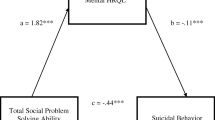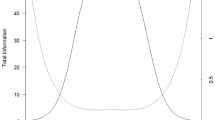Abstract
Although social problem-solving abilities have been consistently associated with indicators of behavioral health, this work has been largely confined to tests of specific theoretical issues. Research has yet to demonstrate how the separate elements of the social problem-solving model relate to different patterns of adjustment, particularly among persons who live with chronic disease. We studied the occurrence of different profiles of social problem-solving abilities observed among persons living with diabetes mellitus. We then examined differences between clusters on measures of life satisfaction and depression. Results indicate that distinct profiles in problem-solving abilities do occur and these groupings can be distinguished by their different patterns of adjustment. Implications for theoretical models of problem solving and clinical assessment and interventions for persons with diabetes are discussed.
Similar content being viewed by others
REFERENCES
Aldenderfer, M. S., & Blashfield, R. K. (1984). Cluster analysis. Newbury Park, CA: Sage.
American Diabetes Association. (1996). Diabetes 1996 vital statistics. Alexandria, VA: Author.
American Diabetes Association. (1997). Economics consequences of diabetes mellitus in theU.S. in 1997. Alexandria,VA: Author.
Anderson, R. M., Funnell, M. M., Butler, P., Arnold, M. S., Fitzgerald, J., & Feste, C. (1995). Patient empowerment: Results of a randomized, controlled trial. Diabetes Care, 18, 943–949.
Arean, P. A., Perri, M., Nezu, A., Schein, R., Christopher, F., & Joseph, T. (1993). Comparative effectiveness of social problem–solving therapy as treatments of depression in older adults. Journal of Consulting and Clinical Psychology, 61, 1003–1010.
Chang, E. C., & D'Zurilla, T. J. (1996). Relations between problem orientation and optimism, pessimism, and trait affectivity: A construct validation study. Behavior Research and Therapy, 34, 185–194.
Craig, T., & Van Natta, P. A. (1978). Current medication use in symptoms of depression in a general population. American Journal of Psychiatry, 135, 1036–1039.
Diener, E., Emmons, R. A., Larsen, R., & Griffin, S. (1985). The satisfaction with life scale. Journal of Personality Assessment, 49, 71–75.
D'Zurilla, T. J., & Nezu, A. M. (1990). Development and preliminary evaluation of the social problem solving inventory. Psychological Assessment, 2, 156–163.
D'Zurilla, T. J., & Nezu, A. (1999). Problem–solving therapy (2nd ed.). New York: Springer.
D'Zurilla, T. J., Nezu, A. M., & Maydeu–Olivares, A. (in press). iManual for the social problem solving inventory–revised (SPSIR). North Tonawanda, NY: Multi–Health Systems.
Elliott, T. (1999). Social problem solving abilities and adjustment to recent–onset physical disability. Rehabilitation Psychology, 44, 315–332.
Elliott, T., Godshall, F., Herrick, S., Witty, T., & Spruell, M. (1991). Problem–solving appraisal and psychological adjustment following spinal cord injury. Cognitive Therapy and Research, 15, 387–398.
Elliott, T., Kurylo, M., & Rivera, P. (in press). Positive growth and adjustment following acquired physical disability. In C. R. Snyder & S. Lopez (Eds.), Handbook of Positive Psychology. London: Oxford University Press.
Elliott, T., & Marmarosh, C. (1994). Problem solving appraisal, health complaints, and health–related expectancies. Journal of Counseling and Development, 72, 531–537.
Elliott, T., & Marmarosh, C. (1995). Social–cognitive processes in behavioral health: Implications for counseling. The Counseling Psychologist, 23, 666–681.
Elliott, T., Sherwin, E., Harkins, S., & Marmarosh, C. (1995). Selfappraised problem solving ability, affective states, and psychological distress. Journal of Counseling Psychology, 42, 105–115.
Elliott, T., Shewchuk, R., & Richards, J. S. (1999). Caregiver social problem solving abilities and family member adjustment to recent–onset physical disability. Rehabilitation Psychology, 44, 104–123.
Elliott, T., Shewchuk, R., & Richards, J. S. (in press). Family caregiver social problem solving abilities and adjustment during the initial year of the caregiver role. Journal of Counseling Psychology.
Glasgow, R. E., Fisher, E. B., Anderson, B., LaGreca, A., Marrero, D., Johnson, S. B., Rubin, R., & Cox, D. J. (1999). Behavioral science in diabetes. Diabetes Care, 22, 832–843.
Godshall, F., & Elliott, T. (1997). Behavioral correlates of selfappraised problem–solving ability: Problem–solving skills and health–compromising behaviors. Journal of Applied Social Psychology, 27, 929–944.
Grant, J. S. (1999). Social problem–solving partnerships with family caregivers. Rehabilitation Nursing, 24, 256–262.
Heppner, P. P. (1988). A manual for the problem solving inventory. Columbia, MO: University of Missouri.
Heppner, P. P., & Baker, C. E. (1997). Applications of the problem solving inventory. Measurements and Evaluation in Counseling and Development, 29, 229–241.
Heppner, P. P., & Krauskopf, C. J. (1987). An information processing approach to personal problem solving. The Counseling Psychologist, 15, 371–447.
Herrick, S., Elliott, T., & Crow, F. (1994). Self–appraised problem solving skills and the prediction of secondary complications among persons with spinal cord injury. Journal of Clinical Psychology in Medical Settings, 1, 269–283.
Houts, P. S., Nezu, A. M., Nezu, C. M., & Bucher, J. A. (1996). The prepared family caregiver:Aproblem–solving approach to family caregiver education. Patient Education and Counseling, 27, 63–73.
Jenkins, C.D. (1995). An integrated behavioral medicine approach to improving care of patients with diabetes mellitus. Behavioral Medicine, 21(Summer), 53–65.
Johnson, S. B. (1995). Insulin–dependent diabetes mellitus in childhood. In M. C. Roberts (Ed.), Handbook of pediatric psychology (2nd ed., pp. 286–309). New York: Guilford Press.
Kurylo, M., Elliott, T., & Shewchuk, R. (2001). FOCUS on the family caregiver:Aproblem–solving training intervention. Journal of Counseling and Development, 79, 275–281.
Lengnick–Hall, C. A. (1995). The patient as the pivot point for quality in health care delivery. Hospital & Health Services Administration, 40, 25–39.
Lustman, P. J., Griffith, L. S., Gavard, J. A., & Clouse, R. E. (1992). Depression in adults with diabetes. Diabetes Care, 15, 1631–1639.
Maydeu–Olivares, A., & D'Zurilla, T. J. (1996). A factor analytic study of the social problem solving inventory: An integration of theory and data. Cognitive Therapy and Research, 20, 115–133.
Mechanic, D. (1998). Public trust and initiatives for new health care partnerships. The Milbank Quarterly, 76, 281–302.
Miller, D., Shewchuk, R., Elliott, T., & Richards, S. (2000). Nominal group technique: A process for identifying diabetes self–care issues among patients and caregivers. The Diabetes Educator, 26, 305–314.
Nezu, A. M. (1987).Aproblem solving formulation for depression: Aliterature review and proposal of a pluralistic model. Clinical Psychology Review, 7, 121–144.
Nezu, A. M., & D'Zurilla, T. J. (1989). Social problem solving and negative affect. In P. Kendall & D. Watson (Eds.), Anxiety and depression: Distinctive and overlapping features (pp. 285–315). San Diego, CA: Academic Press.
Nezu, A. M., & Perri, M. G. (1989). Social problem solving therapy for unipolar depression: an Initial dismantling investigation. Journal of Consulting and Clinical Psychology, 57, 408–413.
Radloff, L. S. (1977). The CES–D scale: A self–report depression scale for research in the general population. Applied Psychological Measurement, 1, 385–401.
Richards, C. S., & Perri, M. G. (1978). Do self–control treatments last? An evaluation of behavioral problem solving and faded counselor contact as treatment maintenance strategies. Journal of Counseling Psychology, 25, 376–383.
Roberts, J., Brown, G. B., Streiner, D., Gafni, A., Pallister, R., Hoxby, H., Drummond–Young, M., LeGris, J., & Meichenbaum, D. (1995). Problem–solving counselling or phone–call support for outpatients with chronic illness: Effective for whom? Canadian Journal of Nursing Research, 27(3), 111–137.
Rubin, R. R., & Peyrot, M. (1992). Psychosocial problems and interventions in diabetes. Diabetes Care, 15, 1640–1657.
Sadowski, C., Moore, L. A., & Kelly, M. L. (1994). Psychometric properties of the social problem–solving inventory (SPSI) with normal and emotionally–disturbed adolescents. Journal of Abnormal Child Psychology, 22, 487–500.
Shewchuk, R., Johnson, M., & Elliott, T. (2000). Self–appraised social problem solving abilities, emotional reactions, and actual problem solving performance. Behaviour Research and Therapy, 38, 727–740.
Speece, D.L. (1990). Methodological issues in cluster analysis:How cluster become real. In H. L. Swanson & B. Keogh (Eds.), Learning disabilities: Theoretical and research issues (pp. 201–213). Hillsdale, NJ: Erlbaum.
Statsoft, Inc. (1999). Statistica: Volume III. Tulsa, OK: Statsoft.
Surwit, R., Schneider, M., & Feinglos, M. (1992). Stress and diabetes mellitus. Diabetes Care, 15, 1413–1422.
Toobert, D. J., & Glasgow, R. E. (1991). Problem solving and diabetes self–care. Journal of Behavioral Medicine, 14, 71–86.
Wagner, E. H., Austin, B. T., & Von Korff, M. (1996). Organizing care for patients with chronic illness. The Milbank Quarterly, 74, 511–544
Witty, T. E., Heppner, P. P., Bernard, C., & Thoreson, R. (in press). Problem solving appraisal and psychological adjustment of persons with chronic low back pain. Journal of Clinical Psychology in Medical Settings.
Author information
Authors and Affiliations
Rights and permissions
About this article
Cite this article
Elliott, T.R., Shewchuk, R.M., Miller, D.M. et al. Profiles in Problem Solving: Psychological Well-Being and Distress Among Persons with Diabetes Mellitus. Journal of Clinical Psychology in Medical Settings 8, 283–291 (2001). https://doi.org/10.1023/A:1011920914079
Issue Date:
DOI: https://doi.org/10.1023/A:1011920914079




